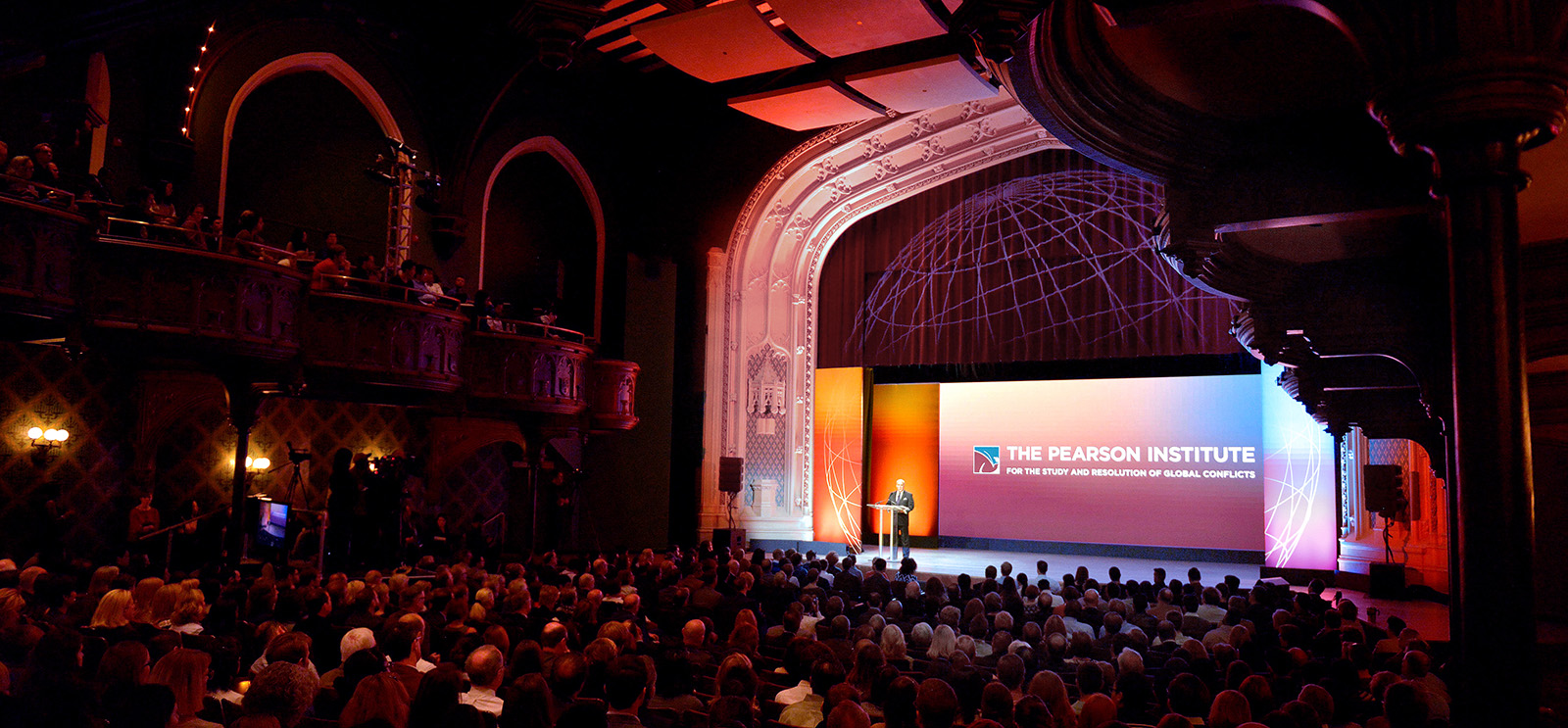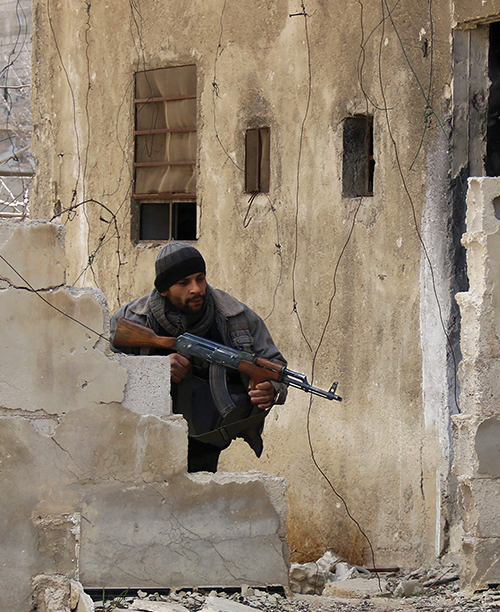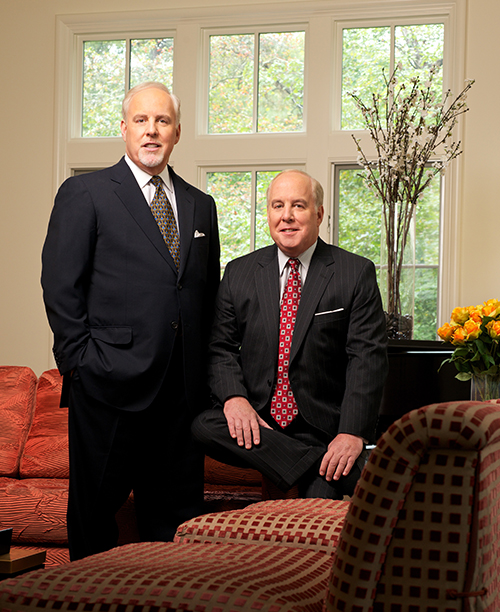
The $100 million gift establishing The Pearson Institute for the Study and Resolution of Global Conflicts and The Pearson Global Forum was announced before a standing-room crowd at Mandel Hall. (Photography by Joel Wintermantle)
Data-driven research at the global institute will spur new insights into violent conflict and inform public policy.
It could have been almost any early Sunday afternoon, gathered around the Pearson family’s dinner table in Iowa discussing the important (and sometimes unimportant) issues of the day. Normally the four brothers—Tom, Tim, Philip, and David—were expected to bring to the table not just healthy appetites but topics of personal interest. And their parents, a prominent Methodist pastor and a college professor of religion and theater, would encourage the boys to share, develop, and expand their ideas. But, on this day, the conversation was especially charged and stimulating. Desmond Tutu was the family’s dinner guest, and the discussion was focused on theology.
Early experiences like this with influential political leaders, missionaries, scholars, and writers left a lasting impression on the Pearson brothers. The values their parents lived, and the desire they cultivated in their four sons to delve deeply into things, fueled an enduring interest in the world. And their parents’ strong humanitarian spirit engendered deep concern about the consequences of clashes that threatened civil rights and individual freedoms. The brothers still keep framed copies in their offices and homes of a threatening note the Ku Klux Klan left on the doorstep of their childhood home under the cover of darkness on a cloudless summer night in Iowa. It said, “The Klan is watching you.”
Social responsibility and the desire to make a difference are the driving forces behind The Pearson Institute for the Study and Resolution of Global Conflicts and The Pearson Global Forum at the University of Chicago Harris School of Public Policy. The landmark initiative, created in late 2015 through a transformative $100 million gift by The Thomas L. Pearson and The Pearson Family Members Foundation, places the University of Chicago and Chicago Harris at the forefront of global conflict resolution. The gift is equal in size to the second-largest gift in the University’s history.

The Pearson Institute and The Pearson Global Forum will be the first of their kind devoted solely to the study, discussion, and resolution of global conflicts. They will fill a critical gap in identifying new strategies rooted in innovative, evidence-driven research approaches. The Pearson Institute and The Pearson Global Forum will act as catalysts to promote research practices and share insights that will inform public policy.
“This is an extraordinarily important undertaking,” says Richard Haass, the president of the Council on Foreign Relations and an expert on US foreign policy, who has been recognized for his efforts to promote international peace and conflict resolution. “It has multiple dimensions that include research, convening power, and education. From my experience, a lot of what we call history results from the intersection of people and ideas, and The Pearson Institute and The Pearson Global Forum embrace both.”
A family committed to humanity
Growing up in the Pearson household was an education by example for the four sons. The boys’ father, the Rev. Dr. Richard L. Pearson, was a prominent Methodist minister deeply devoted to equal rights and social justice. In the summer of 1965, his convictions led him to Selma, Alabama, where he marched with Dr. Martin Luther King Jr. and participated in voter registration drives across the deep South. At the invitation of President Carter in 1979, their father attended a White House briefing on disarmament talks with the Soviet Union. “I remember him as a compassionate leader who believed in the goodness of mankind and in the love of his God,” Tim Pearson says. “To parishioners, he was an approachable man who was widely loved and respected for embracing the highest hopes and values.”
“In his sermons, our father often invoked the well-known biblical passage, ‘To whom much is given, much is required,’” Tom Pearson recalls. “That’s become very much a filament in the fabric of our lives—the drive to make the most of our talents and gifts—and to do good works.”
Their mother, Ramalee E. Pearson, grew up as a Methodist minister’s daughter to become a committed homemaker and professor of religion and drama at Morningside College in Sioux City, Iowa, and later at Iowa Lakes Community College in Estherville, Iowa. She juggled her hectic schedule to make time for food drives, soup kitchens, and other volunteer activities with members of her church. Ramalee also immersed herself in community theater, one summer playing the lead role in Mame—a slightly risqué role for a minister’s wife in the 1970s. Tom recalls, “She taught us by example the value of hard work, the responsibility to help others, and an especially enduring lesson: that a good life is an engaged life.”
“The Pearson family is very aware of the impact every one of us can make if we choose to do so in our community,” says Kathryn Hall, the former US ambassador to Austria. “They were raised in a family committed to humanity, where service is part of who they are.”
Individuals can make a difference
The brothers took inspiration and direction from an unexpected source when a global corporate sponsorship agreement Tim negotiated in 2003 led to Oslo, Norway—and into the inner circle of Nobel Peace Prize laureates.
At the time, Tim served as the first-ever chief marketing officer of the global audit, tax, and consulting firm KPMG. As a vice chairman, he also served on the US management committee and the international executive team, gaining new perspectives on the impact global conflicts can have on societies, economies, businesses, and citizens.
During the same period, Tom was senior vice president, general counsel, and corporate secretary of Alliance Resource Partners LP and Alliance Holdings GP, LP—two publicly traded master limited partnerships. Previously, he co-led the leveraged buyouts that culminated in the two public stock offerings for the Tulsa, Oklahoma–based energy firm, which is the third-largest coal mining company in the eastern United States.
In the decade during which KPMG acted as founding global partner of the Nobel Peace Center in Oslo, the brothers had occasions to converse with Nobel Peace Prize recipients, including Muhammad Yunus, Mohamed ElBaradei, and Nelson Mandela. They were especially drawn to Kenyan environmental and political activist Wangari Muta Maathai. Her Green Belt Movement championed environmental sustainability and economic advancement for women.
“Tom and I were deeply influenced by the personal stories of the Nobel Peace Prize laureates—their own process of self-discovery and the journey they took to realize their life calling,” Tim says. “We learned that individuals can indeed make a difference in the world. We ultimately came to believe that individual efforts to create a world more at peace could be even more impactful through a fact-driven, metric-based, analytical approach.”

The brothers also learned some valuable lessons in philanthropy. “We surveyed the current landscape and looked for a model that would provide an intellectual and positive return on our philanthropic investment,” Tom says. “The strategic approach we adopted is driven by a clear mission with goals and objectives, strong institutional partnership, active involvement, executional rigor, an ‘asset-light’ structure, and accountability.”
Today Tom serves as chairman of The Thomas L. Pearson and The Pearson Family Members Foundation, whose gift to the University established The Pearson Institute and The Pearson Global Forum. He also sits on the Executive Council of Cohesive Capital Partners, where he advises partners of the New York City–based private equity firm on global and regional economic, political, and industry matters.
Tim is now president and CEO of The Thomas L. Pearson and The Pearson Family Members Foundation. He also advises and counsels senior management teams and boards of Fortune 1000 companies on business and brand strategy through his own Atlanta-based consultancy, Pearson Advisors || Partners. In 2011 McGraw-Hill published his New York Times best seller The Old Rules of Marketing are Dead, which explains how brands must evolve to stay relevant in today’s internet-dominated world.
The single most important issue of today
The Pearson brothers have supported many charitable organizations over the years. But when their parents passed, they began to discuss what each desired the Pearson family’s legacy to be after their own passings. Conversations at a family home in the Utah mountains among the brothers quickly coalesced. The Pearson family would help make the world a less violent place by supporting research aimed at reducing global conflicts, and the application of research conclusions to inform related public policy.
“There’s no single issue that’s more important today than the study of the intersection of war, failed states, terrorism, and economic cataclysms—and more importantly, the response that the design of policies directed toward forming a more peaceful world will have,” Tom says. “Today, 59.5 million people are refugees, displaced, or seeking asylum. The time to act is now.”
In 2012 Tim and Tom, with the endorsement of David and Philip, took the lead carrying the family legacy forward and began to search in earnest for the right institution to advance their vision. They evaluated a number of leading US universities but quickly became convinced that the University of Chicago would be the best partner. Tim explains, “The University has committed leadership. It has an existing school, the Harris School of Public Policy Studies, where The Pearson Institute can reside and undertake new forms of interdisciplinary and data-driven research. It has global reach through its collaborative University Centers in Paris, Beijing, Delhi, and Hong Kong. And from its inception, the University has fostered an environment in which rigorous inquiry is successfully applied to society’s toughest problems.”
The Pearson Institute will work in three strategically connected areas. Researchers from around the world will draw on proven methodologies used to study a variety of other disciplines—health, education, and environmental policy, to name a few. The science of violent conflicts begins with theoretically important questions and strong hypotheses guided by rigorous theory. Researchers will collect detailed microlevel data through field research or their own trials or surveys. And they can be expected to employ randomized control trials, statistical analysis, and sophisticated modeling. This disciplined approach enables researchers to move beyond correlation-based conclusions to discover causal relationships that provide the most reliable foundation for effective public policy.
“In managing the Alliance companies, we focused on a data-driven approach,” Tom says, “and we applied careful thought and rigorous analysis to confront the most difficult problems facing Alliance and our country’s energy requirements. We are confident that The Pearson Institute itself, and the quantitative research it undertakes, will apply similar rigor to move from fact-based research, to informing public policy decisions, to guiding successful applications that reduce global conflicts.”
The Pearson Global Forum will convene the international policy and academic community annually to recognize new quantitative approaches and findings. It will also present and host conferences and other events highlighting successful applications of The Pearson Institute’s research to inform public policy as applied to the resolution of global conflicts.
The Pearson family gift will also enable the University to establish four named professorships of global conflict studies at The Pearson Institute, one held by a prominent scholar who will act as faculty director and set the research agenda. The Pearson Institute will also encompass the creation of the Pearson Fellows program for master’s of public policy students and the Pearson Scholars program for PhD students working in this specialized area of scholarship.
“When I heard about the Pearsons’ gift to the University of Chicago, I was blown away,” says Bill George, senior fellow at Harvard Business School, former chair and CEO of Medtronic, and the best-selling author of Authentic Leadership: Rediscovering the Secrets to Creating Lasting Value (Jossey-Bass, 2003) and Discover Your True North (Jossey-Bass, 2015). “I had no idea that they were talking about a gift of this magnitude or something that would have this enormous impact. If we can just avoid one armed conflict through the work at The Pearson Institute, that’s going to be a great gift to humanity.”
A global society at peace
The Pearson brothers have traveled far in many respects from dinner with Desmond Tutu in their childhood home to the stage in Mandel Hall, where their gift was announced on September 30, 2015. At the event, University president Robert J. Zimmer remarked that the University is “deeply thankful to the Pearson family for this transformative gift” and that “the study of global conflicts is a field ripe for groundbreaking research approaches.”
“We know the journey ahead will be formidable—to find new ways through The Pearson Institute to study and understand global conflicts, to inform policy significantly and meaningfully, and to share these findings around the world through The Pearson Global Forum,” Tom says. “This mission to contribute to a global society at peace can make a difference in millions of people’s lives. For those committed to making a difference in the world in which we live, we ask everyone interested to join us.”
Rob Squire, AM’83, is a Chicago-based business writer who covers the financial and professional services, health care, higher education, and not-for-profit sectors.
